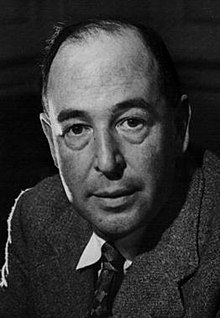Inner ring
| C. S. Lewis | |
|---|---|

Lewis, age 48
|
|
| Born | Clive Staples Lewis 29 November 1898 Belfast, Ireland |
| Died | 22 November 1963 (aged 64) Oxford, England |
| Pen name | Clive Hamilton, N. W. Clerk |
| Occupation | Novelist, scholar, broadcaster |
| Alma mater | University College, Oxford |
| Genre | Christian apologetics, fantasy, science fiction, children's literature |
| Notable works |
The Chronicles of Narnia Mere Christianity The Allegory of Love The Screwtape Letters The Space Trilogy Till We Have Faces Surprised by Joy: The Shape of My Early Life |
| Spouse | Joy Davidman (m. 1956; d. 1960) |
Clive Staples Lewis (29 November 1898 – 22 November 1963) was a British novelist, poet, academic, medievalist, literary critic, essayist, lay theologian, broadcaster, lecturer, and Christian apologist. He held academic positions at both Oxford University (Magdalen College, 1925–1954) and Cambridge University (Magdalene College, 1954–1963). He is best known for his works of fiction, especially The Screwtape Letters, The Chronicles of Narnia, and The Space Trilogy, and for his non-fiction Christian apologetics, such as Mere Christianity, Miracles, and The Problem of Pain.
Lewis and fellow novelist J. R. R. Tolkien were close friends. They both served on the English faculty at Oxford University, and were active in the informal Oxford literary group known as the Inklings. According to Lewis's memoir Surprised by Joy, he was baptised in the Church of Ireland, but fell away from his faith during adolescence. Lewis returned to Anglicanism at the age of 32, owing to the influence of Tolkien and other friends, and he became an "ordinary layman of the Church of England". Lewis's faith profoundly affected his work, and his wartime radio broadcasts on the subject of Christianity brought him wide acclaim.
Lewis wrote more than 30 books, which have been translated into more than 30 languages and have sold millions of copies. The books that make up The Chronicles of Narnia have sold the most and have been popularised on stage, TV, radio, and cinema. His philosophical writings are widely cited by Christian apologetics from many denominations.
...
Wikipedia
